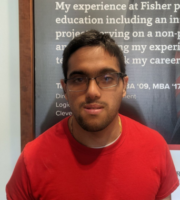
The University of Michigan continues to pour millions of dollars into a variety of anti-racism studies and projects
A University of Michigan graduate student has looked at “weaponized parking” as part of a grant to investigate “anti-racism.”
Lyric Patterson received an undisclosed amount of money through the School for Environment and Sustainability as part of a total pool of $94,000 disbursed by the public university in Ann Arbor for 19 graduate student projects.
The money comes from the university’s Anti-Racism Collaborative, according to a university news release. Two “faculty teams” at the sustainability school were also recipients of a portion of $500,000 given out through “anti-racism grants” from the university’s research office.
Patterson (pictured) studied Lake Merritt in Oakland, California and “the history of land dispossession around the [site]” including its recent addition of parking meters.
“Ethnographic studies reveal experiences of spatial exclusion amid meter-driven threats of gentrification,” her project description states. According to her, “scholars argue that such exclusion must be situated amid interlocking historical struggles where establishments have weaponized parking and planning tools for decades against marginalized communities.”
She also worked to “develop an understanding of the communit[y’s] experience and perspective regarding my argument that meters restricting full curb access to essential services negatively impact the public health and well-being of low-income and BIPOC residents of Oakland.”
Patterson did not respond to two emailed requests in the past week seeking comment on how much money she received for the project and the public policy implications of her research.
Her interests include “equitable access to clean air, clean water, and quality green spaces to Indigenous rights, land back, climate adaptation,” according to her bio. “Lyric is the student leader of Uproot: transcending and radicalizing environmental education, and an elected 2024-2025 [Environmental Justice] Track Leader.”
Professor Rebecca Hardin, the faculty director for DEI at the environmental school, also did not respond to similar questions sent in the past week via email.
However an education commentator at the Heartland Institute criticized the project.
The decision to pay for parking meters is about personal decisions, S.T. Karnick told The Fix via email.
He says people who want to utilize Lake Merritt “may have to forego some other things they would like to have or do, but that “these are decisions that nearly everyone must make every day.”
This project is further proof of how “these anti-racism requirements place nonscientific social and political constraints on the quest for scientific knowledge” which “prevent objectivity and strangle true scientific endeavor,” according to Karnick.
“They are part of an ongoing effort that is rapidly destroying science,” the senior fellow said.
The university has poured millions of dollars into other “anti-racism” projects, including one on racism in dating apps.
It has also studied “anti-racist” health departments, as previously reported by The Fix.
The Big Ten university also offers a “dismantling oppression” certificate for just 12 hours of classes and $525, The Fix previously reported.
Despite massive investments in DEI, including spending $100,000 to launch “DEI 2.0,” with cotton candy included, the university has not made headway in improving the campus climate.
Students report feeling less comfortable on campus, a New York Times investigation recently concluded.
MORE: UWashington Muslim’s hate crime claim again crumbles
IMAGES: University of Michigan; A Priori 1/Shutterstock
Like The College Fix on Facebook / Follow us on Twitter






Please join the conversation about our stories on Facebook, Twitter, Instagram, Reddit, MeWe, Rumble, Gab, Minds and Gettr.